|
|
|
Sort Order |
|
|
|
Items / Page
|
|
|
|
|
|
|
| Srl | Item |
| 1 |
ID:
128476
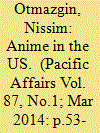

|
|
|
|
|
| Publication |
2014.
|
| Summary/Abstract |
In the past two decades, the enthusiastic global reception of Japanese cultural exports has drawn wide academic attention. In the case of Japanese animation ("anime"), its penetration into the United States, the world's biggest media market, has been described as owing greatly to the crucial role of fans as cultural agents, the deterritorializing effects of globalization, the domestication and heavy editing of anime to suit local tastes, and being part of the wider global flow of Japanese pop culture and "soft power." Drawing on interviews with Japanese and American key personnel in the anime industry, field research and market surveys, this paper focuses on the organizational aspect of the anime market in the United States since the mid-1990s, with particular attention to the role of entrepreneurs, who are imperative for bridging organizational rigidities and cultural differences in global markets. The central argument presented is that entrepreneurship is a central feature in the process of transnational penetration, distribution, reproduction and consumption of cultural commodities and genres, which produce ever more complex and disjunctive economic, cultural and political orders.
|
|
|
|
|
|
|
|
|
|
|
|
|
|
|
|
| 2 |
ID:
131882
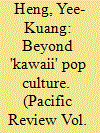

|
|
|
|
|
| Publication |
2014.
|
| Summary/Abstract |
Many studies of Japan's soft power are premised on the 'affective' dimensions of its kawaii pop culture that generate liking or interest. While entirely warranted, emphasising cultural attraction does not do sufficient justice to the multi-faceted foundations of Japanese soft power. Neither does it recognise other components of Joseph Nye's soft power framework stressing the 'normative' appeal of policies that reflect global norms. This article investigates the 'normative' dimensions of Japan's soft power on climate change, and whether it translates into international influence, as Nye predicted. The first section examines the Cabinet's 2010 New Growth Strategy, identifying a potential source of 'normative' soft power in its self-proclaimed desire to reinvent Japan as a 'trouble-shooting nation on global issues', specifically environmental challenges. Next, it analyses how Japanese entities (government, corporations, and NGOs) can transmit 'normative' soft power, and obstacles encountered. These transmission mechanisms include 'Cool Earth Partnership' programmes, the 'Future City Initiative' and the values-based Satoyama Initiative. The final section addresses conceptual implications that arise, and assesses whether Japan's 'normative' soft power has paid dividends. Drawing from literature on pioneer states and external reviews of Japan's alignment with key climate norms, the paper suggests that Japan's normative soft power is lacking in driving agendas at global climate forums. At a pragmatic problem-solving level, however, Japan is increasingly perceived as an attractive source of transferable solutions, reflecting climate norms such as developing eco-friendly technologies and providing assistance to help vulnerable countries mitigate climate change
|
|
|
|
|
|
|
|
|
|
|
|
|
|
|
|
| 3 |
ID:
126224
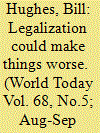

|
|
|
| 4 |
ID:
172805


|
|
|
|
|
| Summary/Abstract |
The article considers how Korean historical drama can enrich the discourse of development and change. The study interrogates Cold War legacies in development thinking in the Philippines entrenched by US education and pop culture and contextualizes Korean drama, a representation of counter-dominant cultural flows, within cultural flows in Asia, the reception of the dramas in Asia, and patronage and influence in the Philippines. Focusing on the historical genre of Korean drama in particular, a cultural negotiation of Cold War influenced-development perspectives in the Philippines is problematized. Unpacking the complex content in Korean historical drama through intertextual analysis provokes a critical elucidation of notions of development and change and underscores interdiscursive utility for the development discourse in the Philippines.
|
|
|
|
|
|
|
|
|
|
|
|
|
|
|
|
| 5 |
ID:
098206
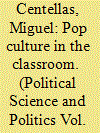

|
|
|
|
|
| Publication |
2010.
|
| Summary/Abstract |
This article discusses the use of pop culture in the classroom as a means to teach foundational political science authors and concepts. I focus on my experience using American Idol as a point of reference to discuss Marx and Engel's The Communist Manifesto and Tocqueville's Democracy in America in undergraduate comparative politics courses. Students are asked to construct a written argument projecting Marx or Tocqueville's perceptions of American Idol, based on their readings. My experiences demonstrate that asking students to reflect on their own contemporary experience through the prism of these two works helps them in three ways: (1) to better understand the ideas of Marx and Tocqueville, as well as their differences; (2) to develop an appreciation for the continued relevance of works in the discipline's canon; and (3) to sharpen and develop critical thinking and analytical skills.
|
|
|
|
|
|
|
|
|
|
|
|
|
|
|
|
| 6 |
ID:
164420
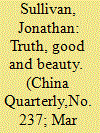

|
|
|
|
|
| Summary/Abstract |
A visit to a Chinese city of any size – looking up at downtown billboards, riding public transport, shopping at a mall – is to be in the presence of a Chinese celebrity endorsing a product, lifestyle or other symbols of “the good life.” Celebrity in China is big business, feeding off and nourishing the advertising-led business model that underpins the commercialized media system and internet. It is also a powerful instrument in the party-state's discursive and symbolic repertoire, used to promote regime goals and solidify new governmentalities through signalling accepted modes of behaviour for mass emulation. The multi-dimensional celebrity persona, and the public interest it stimulates in off-stage lives, requires an academic focus on the workings of celebrity separate to the products that celebrities create in their professional roles. The potential to connect with large numbers of ordinary people, and the emergence of an informal celebrity-making scene in cyberspace symptomatic of changing attitudes towards fame among Chinese people, marks the special status of celebrity within China's constrained socio-political ecology. The motivation for this article is to further scholarly understanding of how celebrity operates in China and to bring this expression of popular culture into the broader conversation about contemporary Chinese politics and society.
|
|
|
|
|
|
|
|
|
|
|
|
|
|
|
|
|
|
|
|
|